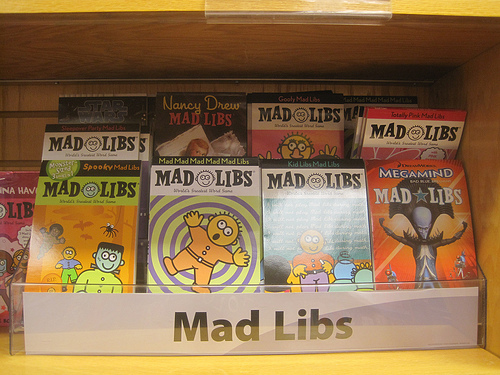You are here
Collocating and Word Choice Using Madlibs
Primary tabs

"Canonyonlands - Needles Backcountry March 2011" via akeg's Flickr stream
Students use an online resource to learn some common ways that writers use a few "hard words". Then, with the children's game Madlibs serving as a model, students generate a template for a game in which they learn new words and collocations from their partners.
This exercise teaches students how to use difficult words properly. The instructor can alter it for use in introductory linguistics, syntax, semantics, and lexicography courses.
Computer classroom with internet access and printing functionality on every computer.
Optional: a Madlibs book, from Penguin group
Free online version of Madlib-type game is available on the Maglib website.
Students use an online resource to learn some common ways that writers use a few "hard words". They use ForBetterEnglish.com, a database of common "word collocations," to compose a paragraph. The database resembles a list of dictionary examples of words used in text, but the most common word combinations are identified. The entry for "impeccable," for example, shows that "impeccable credentials," "impeccable timing," and "impeccable taste" are three word combinations.
Then, with the children's game Madlibs serving as a model, students generate a template for playing a similar game with a partner. This "game" stage helps the students to learn new words and collocations from their partners. A main lesson is that one way to improve one's English usage is to take the step from having a strong vocabulary to knowing how all the words actually fit into sentences.
The instructor should hand out the student instruction sheet and introduce the collocation database in a class prior to the class set aside for the main exercise.
Students should experiment with the collocation database for five or ten minutes to get a feel for it.
On the day of the main exercise, students bring to class a list of three hard words (i.e., recently learned, frequently misused, etc.) with the words' definitions already in mind.
The instructor begins with a two-minute demonstration of Madlibs (or the computer version Madglibs), taking word suggestions from students. The use of the children's game can intrigue the students, and the references to parts of speech can get them to start thinking about traditional grammar.
List three words that you are not sure how to use, but that you want to learn to use.
For each of your three words, use ForBetterEnglish.com to find one way that writers use it. List what you find.
Example:
elicit: "elicit a response"
effect: "investigate the effect"
affect: "affect the outcome"
Write a paragraph using all three of your words. Use the three words the way the "For Better English" website suggests, marking your words in bold.
Ex.: The election results elicited a response from the surprised political scientists. They decided to investigate the effects of political debates on election results. What they found is that debates affect election outcomes much more than they realized.
Save your paragraph as "Original.docx"
Create your "Madlib" paragraph:
- Make a copy of Original.docx, name it "Madlib.docx", and open up Madlib.docx.
- Keep your three "hard words", but replace the words that go with them with "blanks" and the part of speech of the word you removed.
Ex.: The election results elicited a _______ (noun) from the surprised political scientists. They decided to investigate the _______ (plural noun) of political debates on election results. What they found is that debates affect _______ (plural noun) much more than they realized.
Print a hard copy of your Madlib paragraph.
Play Madlibs with your partner:
Name a part of speech for your partner and write in the blank whatever word your partner provides.
- You: "Give me a noun."
- Partner: "astronaut"
Repeat this step for all three blanks.
Give the Madlib to your partner for review.
Switch roles and play Madlibs with your partner's paragraph.
Use "For Better English" to come up with better words to match up with your partner's "hard words".
Check your guesses against your partner's Original.docx.
Now, compose a new paragraph. Use all three of your own words, but follow different suggestions from "For Better English" (e.g., instead of "elicited a response", try "elicited sympathy"). Also, try using all three of your partner's words properly.
Save this final paragraph as "Final.docx" and email both your "Original.docx" and your "Final.docx" to the instructor.
9 points:
3 for correct usage of your three words in Original.docx
3 for correct usage of your three words in Final.docx
3 for correct usage of your partner's words in Final.docx
The exercise counts as a quiz.
The database has its limits. Some words have few or no examples, so instructors might find that they benefit from getting a feel for how deep the database goes and then giving students guidance accordingly.
The title of the lesson and the accompanying image of puzzle pieces suggest that sentences are like puzzles. Individual words are like unique puzzle pieces in that they are governed by rules for combination with other words.
An introductory writing course that includes instruction in practical reasoning and the principles of rhetoric. Also useful in a literary studies course.
-

- Log in to post comments

